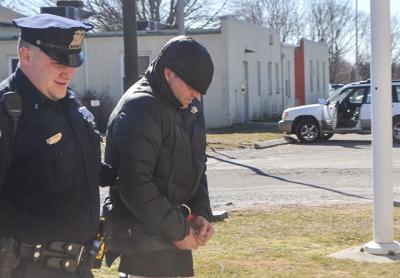Grand Jury Indicts Eames

Jefferson Davis Eames, 48, of Springs was indicted by a grand jury seated in Riverside on Tuesday. The extent of the charge or charges contained in the sealed indictment will be revealed during his arraignment next month in county court in Riverside.
Mr. Eames was arrested by East Hampton Town police on a felony charge of grand larceny while appearing at East Hampton Town Justice Court on separate matters last Thursday afternoon. Unable to make the $20,000 bail set by Justice Lisa R. Rana, he was taken to the county jail in Riverside, where he remained as of yesterday afternoon.
According to Rudy Migliore Jr., an assistant district attorney for Suffolk County, Mr. Eames deposited an unauthorized check from a company called Leisure Tech. The company’s owner, Franklin Rosalia, lodged the complaint after Mr. Eames failed to reimburse him for the money from the check, which Mr. Rosalia told police had been issued accidentally. Mr. Rosalia had done business with Mr. Eames several years ago, he told police. Mr. Eames deposited the check into his own business account on Dec. 27, 2016, police said.
Mr. Eames was recently accused, among other things, of hosting teenagers at several parties with drugs and alcohol at his Neck Path house, where, police say, partygoers were charged admission at the door.
He has been arrested six times in the past six months on an array of charges, and was at the center of considerable controversy after an 18-year-old allegedly overdosed at his house in January.
He arrived at court last Thursday to answer multiple misdemeanor charges as part of a plea deal that he and his lawyers had made with the district attorney’s office. Following a brief court session last Thursday morning, he and one of his attorneys, Eileen Powers, went into a conference room to discuss a deal that would have had him pleading guilty to some of the misdemeanors, while the balance would have been dismissed. He would then have been incarcerated for eight months.
By 1 p.m., however, that deal was off the table when Justice Rana learned that there was a new charge. “I’m not inclined to enter into any plea right now until I know what’s coming down,” she was heard telling the attorneys as they huddled at the bench. “I’m not sure I’m going to want to go ahead with the sentence that has been agreed to.”
When he exited the conference room, Mr. Eames was arrested on the new charge and taken to police headquarters, where his mug shot was taken for the sixth time in the past six months.
During Mr. Eames’s late-afternoon arraignment back at justice court, Mr. Migliore asked for bail to be set at $50,000.
Ms. Powers asked that Mr. Eames be released without posting any bail.
“The purpose of bail is to ensure that Mr. Eames returns to court,” Ms. Powers argued. “Mr. Eames comes to court on a regular basis. If I tell him to be here, he is here. If the court tells him to be here, he is here. With respect to these charges, I’m not sure where the D.A. gets his information, but this check was written to Mr. Eames’s company; he deposited it, along with a series of other checks written to the company. . . . I had a conversation with the complaining witness’s attorney confirming Mr. Eames’s intention to pay the money back. They are working out the details.”
“The information that I read, and correct me if I’m wrong, is that he hadn’t done business with this company for several years,” Justice Rana said.
“I think it is just a form of punishment to put $50,000 bail on him. The court is well aware that Mr. Eames comes back to court,” Ms. Powers said.
“That he has been coming to court regularly is one of multiple factors to be considered when determining bail,” Justice Rana said. “And considering the fact that he is now looking at a potential sentence — just on the other pleas — of eight months incarceration and now he has this felony charge. . . .” Justice Rana pointed out that the check had allegedly been deposited in December, “and there have been no payments as far as I can tell made to the complaining witness.”
“I’m fascinated that you are taking a position that facts in the case, as stated by the East Hampton police, are gospel,” Ms. Powers said.
Long before these recent events, Mr. Eames had sued East Hampton Town and its Police Department in federal court claiming that the town had violated his constitutional rights in a 2013 case involving an alleged road rage incident.
“I’m not taking a side, but the paperwork has an allegation that is contrary to what you are saying,” Justice Rana told Ms. Powers. “This is now a class D felony, whether you like it or not. They are already apparently going to present it to a grand jury.”
Ms. Powers asked that Mr. Eames be allowed to speak to the grand jury Tuesday, “so they have a chance to hear his side of the story.”
“You can make an application to the supreme court or the county court saying that any bail I set besides [zero] is unreasonable bail,” Justice Rana responded, setting the $20,000 amount.
New York State law gives the 16 to 24 people seated in the grand jury room great latitude in terms of charges, not limiting them only to those made by police during an arrest. While a defendant is allowed to speak to the grand jury, he does not have the right to cross-examine or question evidence presented during the process, which operates in secret.
The fact that Mr. Migliore told Justice Rana that Mr. Eames’s case was going to be presented at 2:30 p.m. on Tuesday signaled that his case has already been investigated by Suffolk County District Attorney Thomas Spota’s office.
